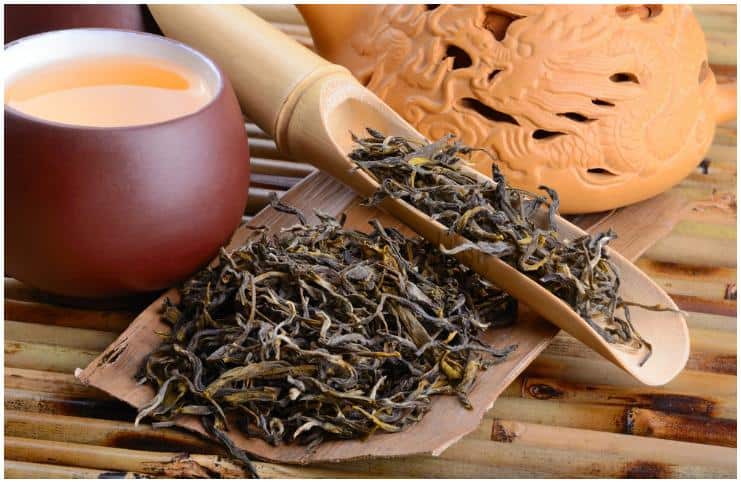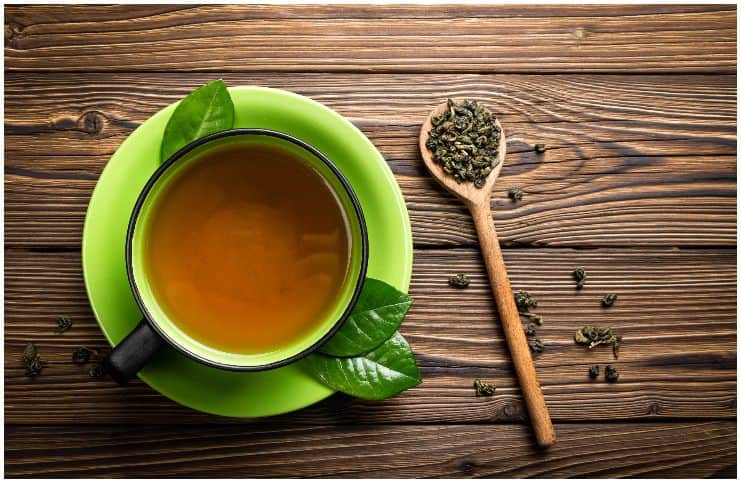Oolong tea, also known as wu long or qing cha, is a traditional Chinese semi-green tea from the stems and leaves of the Camellia sinensis plant.
The traditional home of this tea is China (Fujian province) and Taiwan but presently it is produced in small amounts in Korea and Malaysia.
This tea undergoes a unique process, for example, black tea is fully fermented, oolong tea is semi-fermented and green tea is unfermented. The range of fermentation varies from 8 percent to 80 percent which results in a wide range of aromas and colors.
Nutritional profile
It contains vital minerals such as calcium, potassium, manganese, magnesium, sodium, copper, selenium, and potassium, as well as vitamin A, vitamin B3 and B9, vitamin C, vitamin E, and vitamin K, caffeine and detoxifying alkaloids.
Benefits for weight loss
This traditional Chinese tea has an impressive reputation for helping in weight loss, a benefit touted even in historical tea-drinking nations from Asia.
The main reason is the high content of polyphenols, which are naturally-occurring antioxidants found in a variety of foods including this tea. Once consumed, only about 5-10 percent of polyphenols are directly absorbed in the small intestine, while the rest make their way to the colon to be broken down by our gut.
Polyphenols control the metabolism in the body by activating some enzymes that trigger the functions of the fat cells present in the body. According to a 1999 study by the 2nd Department of Medical Biochemistry, Japan, the consumption of this tea may be an efficient method for the treatment of fatty liver and obesity caused by a high-fat diet (1).
Tip – try drinking this tea before your meals and it may help you lose weight faster.
Scavenges free radicals
Manganese is an essential mineral that is needed by our body in little amounts and serves many functions in the body. This mineral has antioxidant properties, that help it to monitor the activity of free radicals in our body.
Free radicals (they are waste products from different chemical processes) are groups of atoms with an unpaired number of electrons. 100g of brewed tea contains 9% manganese of the recommended daily intake.
Skin health
This tea improves your skin complexion and makes your skin healthy. A 2001 study by the Department of Dermatology, Otsu, Japan concluded that 54 percent of test participants were found to show long-lasting and positive results in terms of skin health after 6 months of daily consumption of this tea (2).
Stress relief
Theanine is an amino acid found mainly in teas coming from the Camellia sinensis plant and is partly responsible for the tea’s impact on mood. This amino acid increases the levels of dopamine (a neurotransmitter accountable for reward-seeking behavior, motivation, and movement) in the brain. Furthermore, theanine contributes to the function of the autonomic nervous system and is involved in regulating the secretion of hormones from the pituitary gland (3).
Lowers LDL cholesterol
LDL is usually referred to as “bad cholesterol.” Too much LDL cholesterol and not enough HDL creates the ideal conditions for your arteries to develop plaque, a hardened mixture of fat, cholesterol, and other elements.
This makes the vessels become less responsive to triggers to constrict and expand, a process that ensures a constant flow of life-giving oxygen to the body’s tissues. This can cause angina or chest pain. In a 2003 study at the Institute for Health Care Science in Osaka, Japan, researchers established that the antioxidants in wu long tea may lower high levels of bad cholesterol (4).
Heart health
Many of the bioactive compounds in the tea leaves make it into the final drink, which contains large amounts of essential nutrients.
A 2009 research at the Kyoto University Graduate School of Medicine, Japan, demonstrated that regular consumption of the tea lessens the risk of death from cardiovascular disease and reduces the threat of heart disease (5).
Side Effects of Oolong Tea
The tea contains caffeine (36 mg/1 cup) which is absorbed from your stomach and reaches its highest levels in your bloodstream in 1-2 hours. Heavy daily caffeine intake (more than 500 to 600 mg per day) may cause numerous side effects, like – fast heartbeat, nervousness, sleep disorders, irritability, restlessness, high blood pressure, kidney stones, or stomach upset.
In addition, consumption of caffeine (after ingesting caffeine, it is absorbed within 45 minutes) in large amounts may interfere with metabolism and absorption of calcium which can ultimately cause your bones to become brittle and weak.
Caffeine also raises the amount of stomach acid and promotes dehydration. As a side note, although many individuals still believe a cup of coffee will help a person “sober-up,” caffeine will not reduce the adverse effects of alcohol.
This tea contains naturally occurring fluorides. Many studies have shown that fluoride consumption can have many adverse effects. However, lower quality teas have more fluoride than higher-quality teas.
Consuming large amounts of tea reduces the absorption of thiamine which may lead to serious complications involving the brain, nervous system, heart, muscles, and stomach and intestines.
Pregnant, nursing women and small children should avoid the consumption of this tea.
Storing
This tea is best kept in a cool, dry place in an airtight container or even in a refrigerator.
Method of preparing
Mix a teaspoon of tea powder to a cup of hot natural spring water and let it steep for ten minutes. Strain the tea and allow it to cool slightly.
It is not recommended to add sugar, honey or milk. You can also prepare this tea by the gongfu brewing method which involves using more tea leaves, but the infusion duration is diminished. This Chinese method allows for several infusions in order to appreciate the tea to the fullest.





